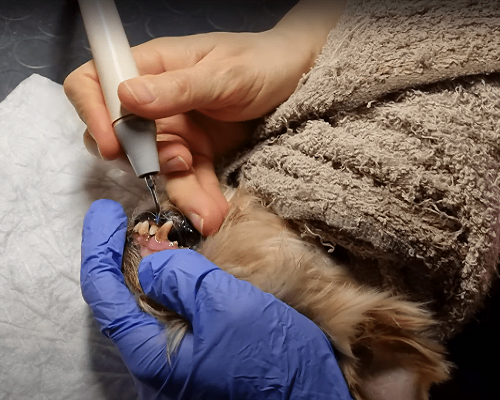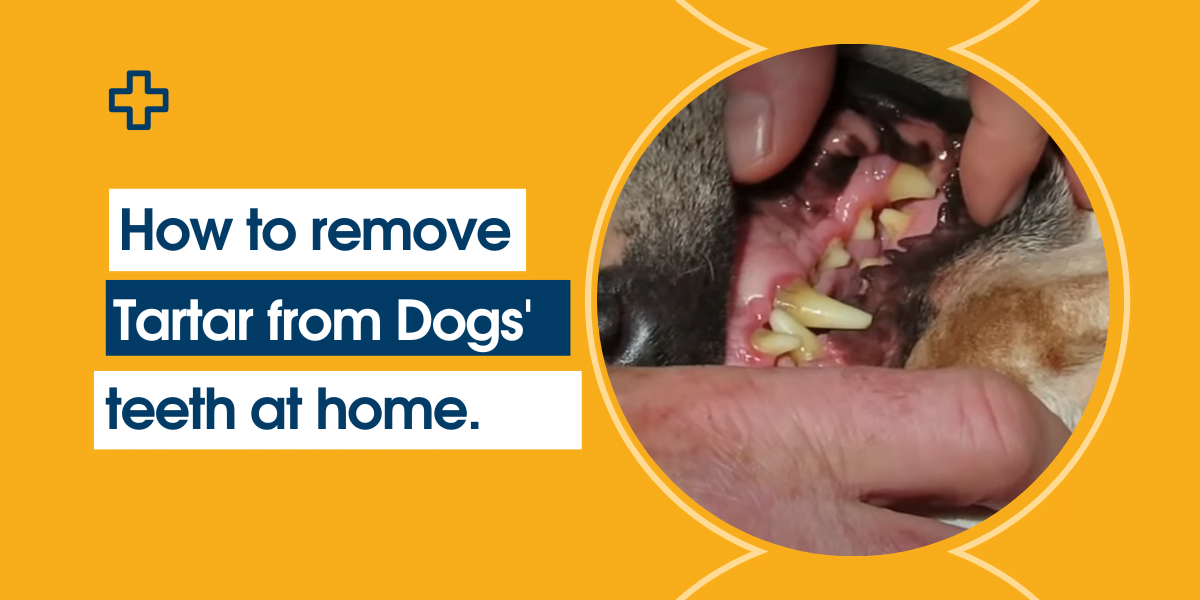Last updated on January 26th, 2024 at 05:31 am
As a pet owner, it is essential to prioritize your dog’s dental health. Tartar buildup on dogs’ teeth can lead to various oral health issues, including gum disease, tooth decay, and bad breath. While regular visits to the veterinarian for professional dental cleanings are necessary, there are also steps you can take at home to remove tartar from your dog’s teeth. This article will guide you through the process, providing you with practical tips and techniques.
Tartar, also known as dental calculus, forms when plaque hardens on the teeth. It provides a breeding ground for bacteria, which can lead to oral health problems. If left untreated, tartar buildup can cause gum inflammation, tooth loss, and systemic infections that can affect your dog’s overall health. By addressing tartar buildup early on, you can prevent these complications and ensure your dog’s oral hygiene.
Signs of Tartar on Dogs’ Teeth
Identifying tartar buildup on your dog’s teeth is crucial for timely intervention. A few normal signs to keep an eye out for incorporate:
- Yellow or brown discoloration on the teeth
- Bad breath (halitosis)
- Red or swollen gums
- Bleeding or receding gums
- Difficulty eating or chewing
- Excessive drooling

If you notice any of these signs, it’s essential to take action to remove the tartar and improve your dog’s oral health.
Home Remedies for Removing Tartar from Dogs’ Teeth
1. Brushing Your Dog’s Teeth
Regular brushing is the most effective way to remove tartar and prevent its buildup. Here’s a step-by-step guide to brushing your dog’s teeth:
- Choose a dog-friendly toothbrush and toothpaste. Avoid using human toothpaste, as it may contain ingredients that are toxic to dogs.
- Introduce your dog to tooth brushing gradually. Start by gently massaging their gums with your finger, then gradually transition to using a toothbrush.
- Use gentle, circular motions to brush your dog’s teeth and gums. Really focus on the back teeth, where tartar development is generally normal. Aim to brush your dog’s teeth at least two to three times a week. Consistency is vital to keeping up with great oral cleanliness.
2. Dental Chews and Toys
Dental chews and toys can serve as a helpful addition to your dog’s oral care routine. They work by stimulating chewing and promoting saliva production, which helps to reduce tartar buildup. Look for dental chews that are specifically designed to clean teeth and massage gums. Avoid chews that are too hard and may cause tooth fractures.
3. Raw Bones
Raw bones can act as natural toothbrushes for dogs, helping to scrape off tartar and massage the gums. It’s important to note that only raw bones should be given to dogs, as cooked bones can splinter and pose a choking hazard. Supervise your dog while they chew on raw bones to ensure their safety.
4. Coconut Oil Pulling
Coconut oil has antimicrobial properties that can help combat bacteria in your dog’s mouth. You can introduce coconut oil pulling as part of your dog’s dental care routine. Simply apply a small amount of coconut oil to a clean cloth or a dog toothbrush and gently rub it on your dog’s teeth and gums. Coconut oil also has the added benefit of promoting healthy gums and freshening your dog’s breath.
Natural Ingredients for Tartar Removal
Apple Cider Vinegar
Apple cider vinegar is known for its antibacterial properties and can help in reducing tartar buildup. Dilute apple cider vinegar with water in a 1:1 ratio and use a clean cloth or a soft toothbrush to apply it to your dog’s teeth and gums. Be cautious not to use too much vinegar, as it may irritate the gums. Rinse your dog’s mouth thoroughly after application.
Baking Soda
Baking soda is a gentle abrasive that can help remove plaque and tartar from your dog’s teeth. Make a glue by blending baking soft drink in with a modest quantity of water. Apply the paste to your dog’s teeth using a toothbrush or a clean cloth. Gently brush the teeth in circular motions, paying attention to areas with tartar buildup. Rinse your dog’s mouth afterward.
Coconut Oil
Coconut oil, in addition to being used for oil pulling, can also be mixed with other ingredients to create a homemade toothpaste for your dog. Combine coconut oil with baking soda and a small amount of finely ground sea salt. Use this mixture to brush your dog’s teeth regularly.
Diet and Nutrition for Dental Health
A proper diet can contribute to your dog’s dental health and reduce tartar buildup. Consider the following dietary recommendations:
Feeding Raw Food
Raw food diets, such as the BARF (Biologically Appropriate Raw Food) diet, can help maintain healthier teeth and gums in dogs. Raw food requires more chewing, which naturally helps remove plaque and tartar. Consult with your veterinarian to ensure a balanced and safe raw food diet for your dog.
Crunchy Fruits and Vegetables
Including crunchy fruits and vegetables in your dog’s diet can provide natural abrasion against tartar. Carrots, apples, and celery are excellent choices. They not only help clean teeth but also provide essential vitamins and nutrients.
Dental Health Supplements
Certain dental health supplements are available in the market that can help maintain oral hygiene in dogs. These supplements often contain natural ingredients like enzymes, probiotics, and antioxidants that promote healthy teeth and gums. Consult your veterinarian for appropriate recommendations.
Professional Dental Cleanings for Dogs
While home care is essential, professional dental cleanings performed by a veterinarian are necessary to address severe tartar buildup. Your veterinarian will thoroughly clean your dog’s teeth using specialized instruments and may recommend dental X-rays to assess the overall oral health. It is generally recommended to schedule professional cleanings annually or as advised by your veterinarian.
Preventing Tartar Buildup in Dogs
Prevention is key to maintaining your dog’s oral health and preventing tartar buildup. Here are a few preventive estimates you can take:
- Maintain a regular dental care routine, including brushing your dog’s teeth and providing dental chews.
- Offer appropriate toys that promote chewing and dental health.
- Provide a balanced diet that supports dental health.
- Avoid feeding your dog excessive sugary or sticky treats.
- Schedule regular veterinary check-ups to monitor your dog’s dental health.
Conclusion
Taking care of your dog’s teeth and preventing tartar buildup is vital for their overall well-being. By following a regular dental care routine at home, incorporating natural remedies, and seeking professional dental cleaning when necessary, you can help ensure your dog’s dental health and prevent oral health issues.
Read More: Phytobiotics for Dogs: A Comprehensive Overview




